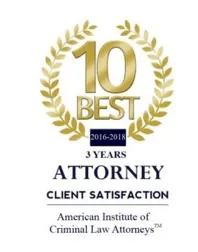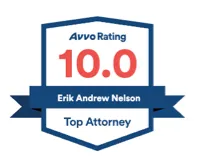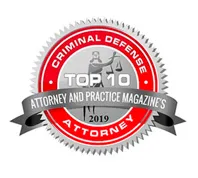Imagine being enveloped in the terrifying reality of facing fraud charges, shackled with the potential repercussions of hefty fines, irreversible damage to your reputation, and even imprisonment. At this critical juncture, navigating the overwhelming sea of legal jargon and dense proceedings can feel impossible— but there’s hope. The silver lining amidst these dark clouds is securing the services of an exceptional fraud charges attorney, a skilled protector who will relentlessly fight for your rights. A courtroom gladiator ready to challenge every accusation hurled against you. In this blog post, we’ll reveal the strategies and criteria necessary to identify and select the finest legal warrior — the best fraud charges attorney for your unique case.
When selecting a fraud charges attorney, it is important to look for experience in handling cases similar to yours and a track record of success. Additionally, choose an attorney with a focus on client-centered practice, good communication skills, and availability. Reading reviews from past clients can provide insight into an attorney’s performance and reputation. It is also important to consider the fees and payment structure before making your final decision.

Understanding Fraud Charges
Fraud is a type of criminal offense where an individual or entity deceives another person or entity to gain money, goods, or services through false pretenses. Fraud covers a wide array of crimes, including identity theft, investment scams, insurance fraud, credit card fraud, and mortgage fraud.
A common example of fraud is when a person uses someone’s Social Security number to obtain a loan or credit card without their permission. Another example is when someone creates fake insurance claims to file for compensation they are not entitled to receive. Each state has its own set of laws governing fraud offenses, with penalties ranging from fines to imprisonment.
It’s important to keep in mind that being accused of fraud doesn’t mean you’re guilty. There must be sufficient evidence to prove that the defendant intentionally deceived the victim for personal gain. A skilled defense attorney can often find holes or inconsistencies in the prosecution’s case and use them to build a strong defense strategy.
For example, if law enforcement accessed your property without a warrant and obtained evidence that led to your arrest on fraud charges, your attorney could argue that the evidence was obtained illegally and have it thrown out of court. This would weaken the prosecution’s case against you, potentially leading to a dismissal of charges or reduced sentencing.
Now that you have a basic understanding of what constitutes fraud charges, let’s delve into the role an attorney plays in defending against these charges.
The Attorney’s Role in Fraud Case Defense
A skilled fraud charges attorney can play many roles in defending against fraud charges. They can work with the prosecution to negotiate plea deals or alternatively develop a solid defense strategy designed to minimize the defendant’s exposure to penalties if they are convicted. Some key areas where an attorney can make a difference include building a solid defense strategy and protecting client rights.
A defense attorney will work closely with their client to gather all the relevant information pertaining to their case. They will examine all evidence provided by the prosecution and conduct an independent investigation to look for holes in the prosecution’s case. Additionally, they will work with experts such as forensic accountants and private investigators to uncover any additional information that could be beneficial to the case.
An attorney will use this information to build a defense strategy that highlights weaknesses or inconsistencies in the prosecution’s case. This may include filing pretrial motions to dismiss certain pieces of evidence, motions to suppress evidence obtained illegally, or motions for a change of venue.
An experienced fraud charges attorney is like a quarterback leading a football team towards victory. They are responsible for organizing the entire defense strategy based on their expertise and experience with similar cases. Like how a quarterback assesses multiple options before choosing the best play, an attorney evaluates different strategies before implementing the best defense plan for their client.
In addition, attorneys protect client rights throughout the legal process by ensuring that law enforcement and prosecution follow proper procedures and guidelines. They can represent clients during police questioning and ensure that their constitutional rights are not violated.
For example, if a search warrant was issued but it failed to specify what items officers were authorized to seize, an attorney could challenge the legality of the search given that it was overbroad and in violation of your Fourth Amendment rights.
Now that we’ve covered how a fraud charges attorney can assist you in building a strong defense strategy and protect your rights let’s discuss some factors to consider when choosing a fraud charges attorney.
- A skilled fraud charges attorney can play a pivotal role in defending against fraud charges by working closely with their client to develop a solid defense strategy designed to minimize exposure to penalties. They can gather all relevant information pertaining to the case, examine evidence provided by prosecution, conduct independent investigations and work with experts to uncover additional information that could benefit the case. Attorneys protect client rights throughout the legal process by ensuring proper procedures and guidelines are followed, representing clients during police questioning and challenging the legality of certain actions if necessary. When choosing a fraud charges attorney, it’s important to consider factors such as experience, expertise, and reputation.
Building a Solid Defense Strategy
When facing fraud charges, building a solid defense strategy is crucial to achieve the best possible outcome. Your attorney should take the time to analyze all aspects of your case and develop a tailored plan to address each issue. This includes reviewing evidence, interviewing witnesses and experts, and identifying potential weaknesses in the prosecution’s case.
For instance, let’s say you are charged with credit card fraud. A good defense strategy would involve investigating whether you actually had permission to use the card in question or if the charges were made due to a mistake in billing. If it is revealed that there was no intention to commit fraud, this can significantly weaken the prosecution’s case.
Additionally, your fraud charges attorney should be prepared to challenge any evidence obtained illegally or through unconstitutional means. They should also explore alternative explanations for any incriminating evidence and consider possible defenses such as duress or entrapment.
Establishing a robust defense strategy not only helps protect your rights but can also increase your chances of obtaining a favorable outcome in court.
Protecting Client Rights
A key role of an attorney in a fraud case is protecting their client’s constitutional rights throughout the legal process. This includes safeguarding against unlawful searches and seizures, ensuring fair treatment during interrogation, and preserving the right to due process.
Take for example a case where an individual is accused of identity theft and banking fraud. In this scenario, an attorney would ensure that any evidence seized by law enforcement adheres to proper protocols and legal procedures. Any evidence obtained through illegal search and seizure would not be admissible in court, potentially weakening the prosecution’s case.
Moreover, it is important for attorneys to communicate effectively with their clients about their rights and how they can best protect them. Attorneys need to act quickly when defending client rights since there is a limited window in which they can challenge any violations. The prosecution will use any missteps to their advantage, so the attorney must stay vigilant.
Therefore, an experienced and skilled fraud charges attorney should be able to actively protect your rights while working to achieve the best possible outcome for your case.
Choosing the Right Fraud Charges Attorney
When it comes to choosing the right fraud charges attorney, there are several factors to consider. First and foremost, you want an attorney who has experience successfully defending clients facing similar charges to yours. Look for a fraud charges attorney who has a proven track record of achieving favorable outcomes for their clients in cases involving fraud.
Another important factor to consider is the attorney’s communication style and availability. You want an attorney who will be responsive to your needs and keep you informed throughout the legal process. Make sure that you feel comfortable communicating with your attorney, and that they are willing to answer your questions and address your concerns.
Ultimately, you want an attorney who will be your advocate in the courtroom and fight tirelessly to protect your rights and achieve your goals. You should look for an attorney who takes a client-centered approach to practice, meaning that they put your needs and interests first.
For example, one client of Erik Nelson’s praised him for his dedication to their case: “Erik went above and beyond what I expected of him. He showed genuine care for my well-being and kept me informed throughout the entire process. His knowledge, experience, and preparation were evident in court when he spoke on my behalf.”
With these factors in mind, let’s move on to evaluating experience and reputation.
Evaluating Experience and Reputation
When evaluating potential fraud charges attorneys, it’s important to not only look at their experience but also their reputation within the legal community. One way to assess an attorney’s reputation is by reading online reviews from past clients or testimonials on their website.
You can also research an attorney’s professional background, such as where they attended law school or if they have any certifications or specializations related to criminal defense. Board certification by the state bar association can provide assurance of an attorney’s expertise in a particular area of law.
It’s also a good idea to ask the attorney about their experience with cases like yours. How many cases have they handled? What was the outcome? An experienced attorney will have a thorough understanding of the legal issues involved in complex fraud charges and will be able to develop a strong defense strategy.
Additionally, an attorney’s reputation can often speak volumes about their abilities and dedication to their clients. Erik Nelson, for example, has established a reputation as a tough and experienced criminal defense lawyer who is willing to take on even the most complex cases. His track record of success both in and out of court is a testament to his skill and dedication.
Some people might argue that choosing an attorney solely based on reputation is not enough. While it’s true that you should also consider factors like communication style and availability, reputation can be an important indicator of an attorney’s ability to deliver results.
With these factors in mind, you’ll be well-equipped to find the right fraud charges attorney for your case. In the next section, we’ll discuss how to prepare for your initial consultation with a potential attorney.
Assessing Communication Styles and Availability
Effective communication between the client and their attorney is critical to a successful defense strategy in a fraud case. Therefore, when choosing a fraud charges attorney, it is essential to assess their communication style and availability.
An attorney who is always available for their clients can be reassuring during a stressful legal process. You want an attorney who will reply promptly to your emails or phone calls. An attorney with a busy schedule may not always guarantee immediate access to them, but they should respond within a reasonable timeframe.
Another important factor to consider is their communication style. A reliable lawyer will be transparent about the details of your case and inform you of every development as it occurs. They’ll explain how the law applies to your situation in simple terms so that you understand what’s happening every step of the way.
When meeting with an attorney in person or over the phone, don’t hesitate to ask questions about their communication policies and practices. It is essential to have complete clarity on how they will provide updates regarding your case.
For instance, suppose you’ve received a charge of fraudulent activities on your credit card. You’re innocent and are seeking legal counsel from various attorneys. One lawyer guarantees prompt responses during business hours. Additionally, you feel comfortable communicating with them through email because you know that they’ll get back to you within 24 hours. The other lawyer takes over three days to return your phone call, which makes you anxious because you need up-to-date information regarding your case.
As a defendant in a fraud case, issues surrounding your charges can be daunting. Therefore, make sure that the lawyer you choose has a proactive approach towards updating you frequently by providing adequate communication.
However, it’s important not to confuse responsiveness with adding value or expertise to your case. Keep in mind that an experienced lawyer may have extremely active caseloads that limit their accessibility. Therefore, it’s essential to balance the two and not compromise legal expertise for authentic communication.
Preparing for Your Initial Consultation
After selecting a fraud charges attorney, it is crucial to prepare for your first consultation with them adequately. Here are some helpful tips:
Firstly, come into the consultation with an open and honest attitude. You’ll want to share all the details you have about your situation with your lawyer. Don’t hold back crucial information because you think it might hurt your case.
Secondly, be prepared to answer any specific questions that your attorney may ask you during the meeting. The law firm will likely schedule a phone or in-person appointment and possibly ask you questions that will describe what happened. Knowing as much detail as possible can help them determine how best to defend you.
Thirdly, compile all documents and records related to the fraud charges against you since they can be very important in building a defense strategy specifically tailored to your case.
Lastly, please take some time to write down any questions you may have for the attorney ahead of your initial consultation. This will ensure that you get all of your inquiries addressed upfront.
For instance, if you’re being charged with fraudulent use of information on applications for bank loans, come up with a list of banks that were involved in such activities and find supportive evidence that disproves those claims.
Being well-prepared and organized before going into an initial consultation sets up the foundation for tackling a fraud charge better.
However, while preparing, avoid making assumptions about what strategy should be adopted based on preliminary information, since an experienced attorney is better positioned to strategize effectively after hearing all available facts.







